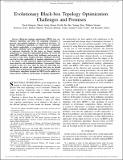Evolutionary Black-box Topology Optimization: Challenges and Promises
Author(s)
Guirguis, David; Aulig, Nikola; Picelli, Renato; Zhu, Bo; Zhou, Yuqing; Vicente, William; Iorio, Francesco; Olhofer, Markus; Matusiks, Wojciech; Coello Coello, Carlos Artemio; Saitou, Kazuhiro; ... Show more Show less
DownloadAccepted version (2.320Mb)
Open Access Policy
Open Access Policy
Creative Commons Attribution-Noncommercial-Share Alike
Terms of use
Metadata
Show full item recordAbstract
© 1997-2012 IEEE. Black-box topology optimization (BBTO) uses evolutionary algorithms and other soft computing techniques to generate near-optimal topologies of mechanical structures. Although evolutionary algorithms are widely used to compensate the limited applicability of conventional gradient optimization techniques, methods based on BBTO have been criticized due to numerous drawbacks. In this article, we discuss topology optimization as a black-box optimization problem. We review the main BBTO methods, discuss their challenges and present approaches to relax them. Dealing with those challenges effectively can lead to wider applicability of topology optimization, as well as the ability to tackle industrial, highly constrained, nonlinear, many-objective, and multimodal problems. Consequently, future research in this area may open the door for innovating new applications in science and engineering that may go beyond solving classical optimization problems of mechanical structures. Furthermore, algorithms designed for BBTO can be added to existing software toolboxes and packages of topology optimization.
Date issued
2020Department
Massachusetts Institute of Technology. Computer Science and Artificial Intelligence LaboratoryJournal
IEEE Transactions on Evolutionary Computation
Publisher
Institute of Electrical and Electronics Engineers (IEEE)